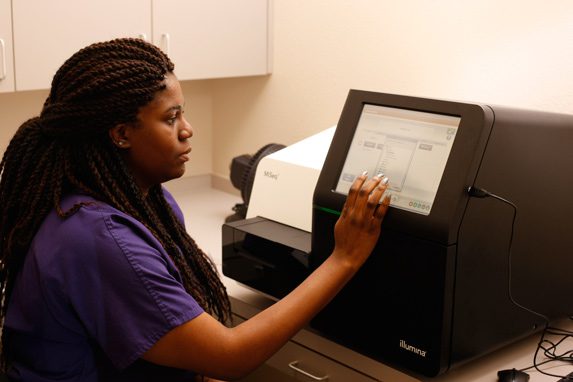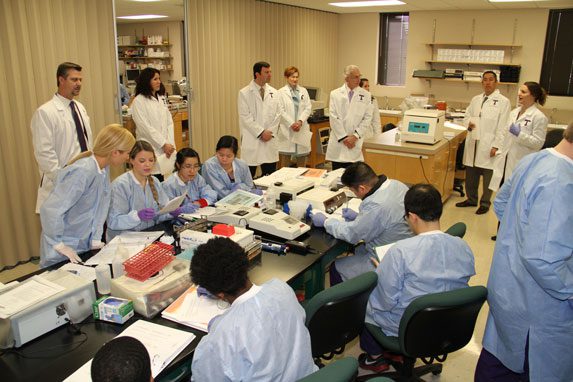Master of Science in Medical Laboratory Science
At Tarleton State University, our Master of Science in Medical Laboratory Science (MLS) degree prepares graduate students for clinical laboratory scientist, medical technology, and laboratory management roles. Through extensive training and hands-on experience, graduates are fully prepared to advance their health care careers.
Choose from the following Medical Laboratory Science program options:
- Thesis track, with a concentration in Molecular Diagnostics
- Non-thesis track, with a concentration in Molecular Diagnostics
- Non-thesis track, with a concentration in Medical Laboratory Scientist certification
The molecular diagnostics concentration, with or without a thesis, qualifies you to sit for the Molecular Biology American Society for Clinical Pathology national board exam and earn professional certification.
Begin our NAACLS accredited degree in the spring or fall, and finish in two years as an adept laboratory scientist. The program is offered through evening courses that meet at our Fort Worth, Texas campus.
What is Medical Laboratory Science?
Medical laboratory science is also known as clinical laboratory science or medical technology. This health care career path encompasses professionals such as clinical pathologists, educational diagnosticians, and clinical laboratory managers. Instead of providing direct patient care, medical laboratory scientists conduct scientific tests, analyze biological specimens, and report results for medical diagnosis and treatment. Earning a degree to become a laboratory scientist provides an alternative to medical or nursing school for an impactful career in health care.
Across Texas and in the United States, the healthcare industry is experiencing a shortage of laboratory professionals that is expected to continue for the next several decades. Tarleton’s laboratory department has a long history of academic excellence in preparing graduate students for addressing laboratory leadership challenges. With professionalism and competence, they serve the health care provider demands in North Central Texas and across the United States.

Estimated Completion
36 credit hours (18+ months)
Application Process
- Admission to Tarleton State University – Graduate Studies
- Additional Program Application Requirements
Cost
Locations Available
Department
College
What can you do with your master’s degree in Medical Laboratory Science?
With a future as a laboratory scientist, our accredited master’s degree in medical laboratory science provides an excellent return on a student’s investment in graduate school. With theoretical knowledge, practical clinical training, and instrumentation skills, our graduates pursue clinical laboratory scientist positions in molecular diagnostic laboratories, laboratory management, or medical research laboratories. Within six months of graduation, 100% of our graduates accept job offers or enroll in doctoral programs.
A degree offering laboratory scientist skills can also be the pathway to a career in industry, sales, hospital administration, or public health. Job opportunities for laboratory professionals that are well-paying and in diverse settings can be found across the country.
To support student’s investment in their future, Tarleton’s College of Health Sciences offers a variety of scholarships for students pursuing the Medical Laboratory Science program including: The Richard C. Schaffer Scholarship and the Dr. May Owen Foundation Scholarship Program. Students may also qualify for awards from Tarleton’s College of Graduate Studies and federal financial aid.
Careers in Medical Laboratory Science
After earning their Master of Science in Medical Laboratory Sciences, many of our graduate students are hired by the hospital in which they complete their practicum rotations. Due to the outstanding reputation of our graduates, hospital laboratories from across the United States have traveled to Tarleton to recruit for jobs such as:
- Lab Director
- Lab Data Analyst
- Supervisor
- Technician
Professional certification is often important to a career in clinical laboratory science.The Tarleton State University Diagnostic Molecular Scientist (DMS) program is fully accredited by NAACLS, the National Accrediting Agency for Clinical Laboratory Sciences. This means we’re held to the highest standards in our industry, helping our students qualify for professional certification. Tarleton graduates boast a 100% pass rate on the Molecular Biology (MB) American Society for Clinical Pathology (ASCP) national board exam. In addition, we offer a concentration to obtain Medical Laboratory Scientist (MLS) certification through a dual degree.
How much do Medical Laboratory Science graduates make?
The average starting salary for medical technologists working in medical and diagnostic laboratories is $52,250 according to the U.S. Bureau of Labor Statistics.
Learn more about graduate studies at Tarleton!
Why study Medical Laboratory Science?
In the Master’s in Medical Laboratory Sciences program, we strive for excellence and professionalism in classroom, clinical, and community settings through academic instruction, research, and service. All faculty members in our accredited MLS master’s degree program have a terminal degree and current certification in their fields. Our diverse range of experience, research interests, and teaching methods enhance learning and opportunities for graduate students.

MLS Labs and Facilities
The Medical Laboratory Science is housed in the Schaffer Building in the Central Hospital District of Fort Worth, which features three lecture rooms, a computer lab, a library, and specialty laboratories, including:
- Hematology, Hemostasis & Urinalysis/Body Fluids
- Chemistry
- Immunohematology & Immunology/Serology
- Microbiology/Parasitology/Mycology
- Histology
- Molecular Diagnostics – Pre-amplification, Amplification and NGS
- Protein Laboratory-Blotting Techniques
With resources like these at their fingertips, master’s degree students are comprehensively prepared to become successful laboratory scientists.
What classes will you take as a Medical Laboratory Science graduate student?
During their Master’s in Medical Laboratory Science coursework, Tarleton students:
- Perform, monitor, and interpret standard quality control procedures by applying principles of medical laboratory science and molecular diagnostics in coursework and labs
- Study topics in statistical methods, immunopathology, body fluids analysis, laboratory management, clinical laboratory science problems, literature review, health care law, and more
- Gain real-world experience through a practicum, field experience, or internship
View all required classes for the master’s degree.
Accreditation
The Master of Science in Medical Laboratory Science is accredited by:
- Southern Association of Colleges and Schools Commission on Colleges (SACSCOC)
- National Accrediting Agency for Clinical Laboratory Sciences (NAACLS)
Admissions and Academic Pathways
What master’s degree programs are related to Medical Laboratory Science?
In addition to the Master of Science in Medical Laboratory Services, Tarleton offers a number of healthcare graduate degrees:
- Post-Bachelor’s Clinical Laboratory Science/Medical Technology Certification
- MSN in Nursing Administration
- MSN in Nursing Education
- MS in Biology
Learn more about Tarleton’s MS in Medical Laboratory Science!
Tarleton State University’s Master of Science in Medical Laboratory Sciences offers the in-demand, comprehensive training needed to become a clinical scientist and laboratory manager. Request information to learn more about earning your Medical Laboratory Sciences degree to advance your health care career.







